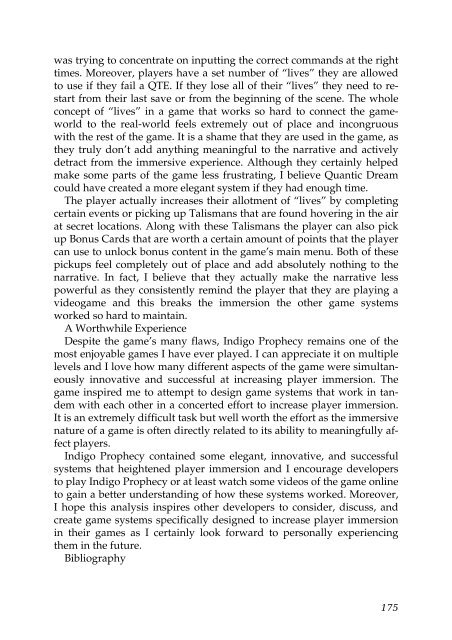Well Played 2.0: Video Games, Value and Meaning - OpenLibra
Well Played 2.0: Video Games, Value and Meaning - OpenLibra
Well Played 2.0: Video Games, Value and Meaning - OpenLibra
Create successful ePaper yourself
Turn your PDF publications into a flip-book with our unique Google optimized e-Paper software.
was trying to concentrate on inputting the correct comm<strong>and</strong>s at the right<br />
times. Moreover, players have a set number of “lives” they are allowed<br />
to use if they fail a QTE. If they lose all of their “lives” they need to restart<br />
from their last save or from the beginning of the scene. The whole<br />
concept of “lives” in a game that works so hard to connect the gameworld<br />
to the real-world feels extremely out of place <strong>and</strong> incongruous<br />
with the rest of the game. It is a shame that they are used in the game, as<br />
they truly don’t add anything meaningful to the narrative <strong>and</strong> actively<br />
detract from the immersive experience. Although they certainly helped<br />
make some parts of the game less frustrating, I believe Quantic Dream<br />
could have created a more elegant system if they had enough time.<br />
The player actually increases their allotment of “lives” by completing<br />
certain events or picking up Talismans that are found hovering in the air<br />
at secret locations. Along with these Talismans the player can also pick<br />
up Bonus Cards that are worth a certain amount of points that the player<br />
can use to unlock bonus content in the game’s main menu. Both of these<br />
pickups feel completely out of place <strong>and</strong> add absolutely nothing to the<br />
narrative. In fact, I believe that they actually make the narrative less<br />
powerful as they consistently remind the player that they are playing a<br />
videogame <strong>and</strong> this breaks the immersion the other game systems<br />
worked so hard to maintain.<br />
A Worthwhile Experience<br />
Despite the game’s many flaws, Indigo Prophecy remains one of the<br />
most enjoyable games I have ever played. I can appreciate it on multiple<br />
levels <strong>and</strong> I love how many different aspects of the game were simultaneously<br />
innovative <strong>and</strong> successful at increasing player immersion. The<br />
game inspired me to attempt to design game systems that work in t<strong>and</strong>em<br />
with each other in a concerted effort to increase player immersion.<br />
It is an extremely difficult task but well worth the effort as the immersive<br />
nature of a game is often directly related to its ability to meaningfully affect<br />
players.<br />
Indigo Prophecy contained some elegant, innovative, <strong>and</strong> successful<br />
systems that heightened player immersion <strong>and</strong> I encourage developers<br />
to play Indigo Prophecy or at least watch some videos of the game online<br />
to gain a better underst<strong>and</strong>ing of how these systems worked. Moreover,<br />
I hope this analysis inspires other developers to consider, discuss, <strong>and</strong><br />
create game systems specifically designed to increase player immersion<br />
in their games as I certainly look forward to personally experiencing<br />
them in the future.<br />
Bibliography<br />
175

















